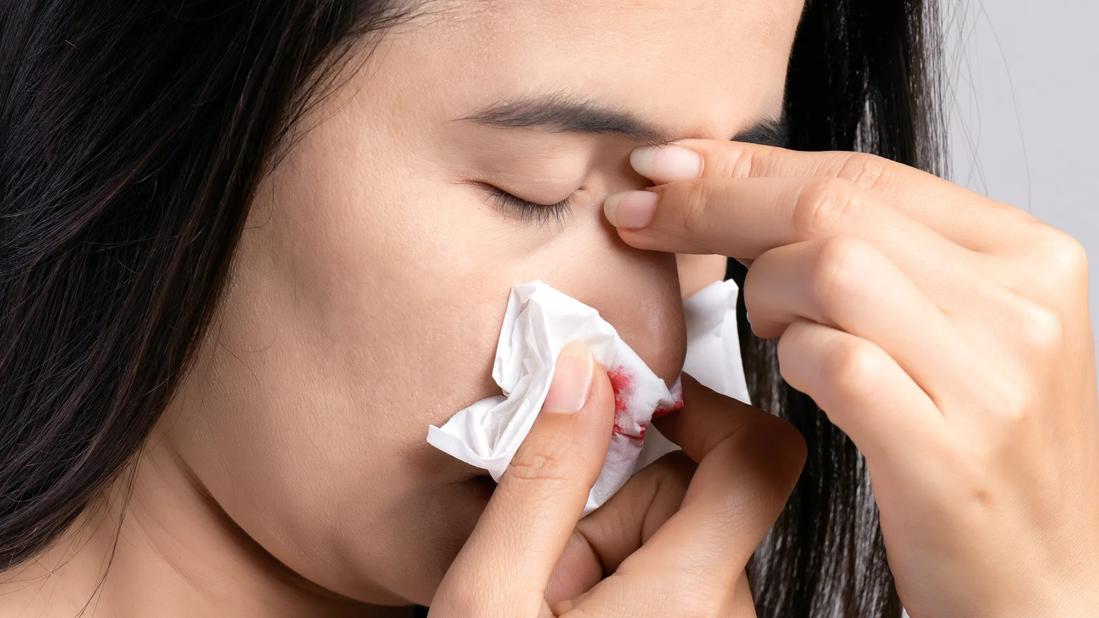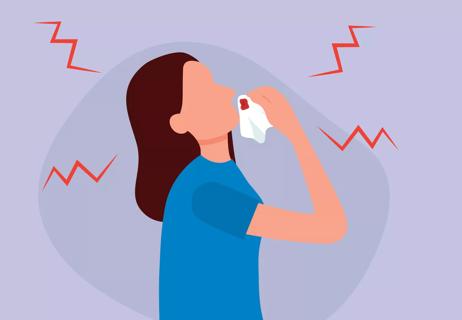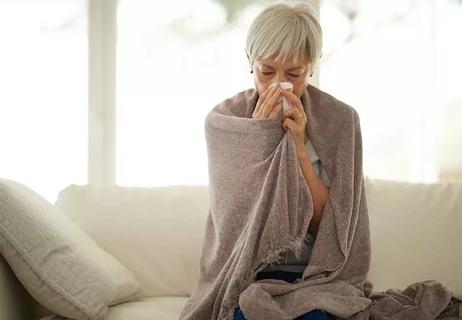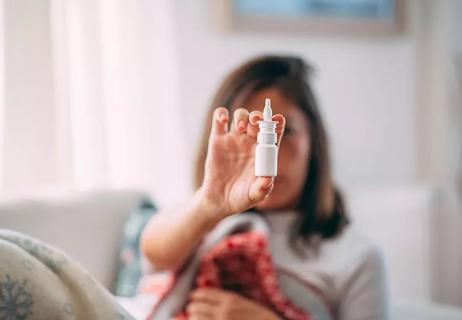Dry air, allergies or nose-picking may be to blame for nighttime epistaxis

Ever wake up to a bloody nose that makes it look like you lost a middle-of-the-night fight? It’s a situation that can feel scary and unsettling. After all, you’re not just supposed to randomly bleed while sleeping.
Advertisement
Cleveland Clinic is a non-profit academic medical center. Advertising on our site helps support our mission. We do not endorse non-Cleveland Clinic products or services. Policy
But before you worry too much, know this: Nighttime nosebleeds are common and aren’t usually a reason for concern. (Except for the condition of your pillowcase, of course.).
So, why do these nasal blood gushers occur while you’re peacefully catching some ZZZs — and can they somehow be prevented? Ear, nose and throat specialist Swathi Appachi, MD, has your answers.
Although waking up with a nosebleed (epistaxis) may seem random, there’s usually a simple explanation as to why they start, says Dr. Appachi. Here are three of the more common causes, plus ways to address them.
Let’s be honest here: Everyone digs in a nostril from time to time to address an uncomfortably large booger. Kids are particularly prone to sticking a finger up there, but adults mine that nasal shaft, too — sometimes, unknowingly while sleeping.
That area of the nose you’re probing, known as the septum, is prone to irritation and bleeding if touched. Five different blood vessels meet in the septum, and they’re very sensitive.
“If you touch the blood vessels, they can crack and bleed,” explains Dr. Appachi.
The solution: Try a preventive approach to avoid waking up with a bloody nose from nose-picking.
Dried-up mucus (aka “boogers”) in the nose can be uncomfortable and hard to blow out, a reality that sometimes drives folks to resort to manual removal. Adding a little moisture may be all it takes to resolve the issue.
Advertisement
“Keep the inside of your nose moist and you won’t have as much desire to pick,” she recommends. “Drug-free nasal moisturizers [such as saline spray] can soften mucus and make it easier to clear with gentle blowing.”
Low humidity levels in your house can be like a … well, punch in the nose.
“The septum’s blood vessels are very sensitive to dryness,” notes Dr. Appachi. “When the mucus membranes in the nose dry out, the blood vessels are exposed. They can crack, causing bleeding.”
This is more likely to happen at night when you’re breathing through your nose, too, which could explain waking up to a bloody nose in the morning.
Humidity levels that drop below 30% in your house can leave you vulnerable to nosebleeds. Those levels are more common during seasons when you’re running the heat or air conditioning. Certain climates also may limit the moisture in the air.
Purchasing a hygrometer, a device that measures humidity levels, can let you know where your home stands.
Signs your home may be on the low humidity side include:
The solution: Just add water! Running a vaporizer in your bedroom while you sleep may help limit nighttime nosebleeds by putting more moisture in the air. A home humidifier also is worth considering.
For double defense against nighttime nosebleeds, pair your humidifier with a nasal moisturizer. “Use saline spray then some ointment before going to bed,” she suggests.
A runny nose can cause irritation and dehydration in your nose, which can lead to waking up to unexpected nosebleeds. Your nose will get even more irritated if you’re blowing your nose hard and frequently.
“Forceful nose blowing can cause trauma to the septum and bleeding,” explains Dr. Appachi.
The solution: Regularly using saline spray when you have a cold can help soften nasal secretions and make your output less gunky. “And when you have to blow your nose, try to do it gently,” she advises.
Decongestant nasal sprays contain medication or active ingredients to help with stuffiness. Try to avoid using them for more than three days in a row, as these sprays can cause a rebound effect and make you feel more congested.
If you’re regularly dealing with congestion, talk to a healthcare provider to determine the cause and explore treatment options.
Even if you take precautions, nosebleeds can happen at night (or anytime, for that matter). So, let’s talk about how to stop them if the blood just won’t stop flowing.
“Lean forward and pinch the nostrils for at least five minutes without stopping,” says Dr. Appachi. “Many people stop applying pressure after a minute or two before the blood has clotted. Resist the urge to let go too soon.”
Advertisement
Most nosebleeds should stop after applying 10 to 15 minutes of gentle pressure.
Most nosebleeds are nothing to worry about and stop with just a little care and attention. But there are times or circumstances when you should seek medical attention.
Those instances include if you:
Advertisement
Learn more about our editorial process.
Advertisement

If your nose is constantly running, it could be allergies, chronic sinusitis, nasal polyps or other concerns

Allergies, indigestion and the effects of gravity can all mess with your nose at night

Staying calm, sitting up straight and gently pinching the sides of your nostrils can help a bloody nose go away faster

Take care of your runny or stuffy nose by staying hydrated, using a humidifier and considering a medication

Allergies, acid reflux and even pregnancy can increase drainage and upset your stomach

Seek help if bleeding doesn’t stop or they’re interfering with your life

It’s usually the way your nose manages airflow, but sometimes, it could be other issues

Correct positioning is one of the keys to getting the best results

Wearing a scarf, adjusting your outdoor activities and following your asthma treatment plan can help limit breathing problems

Your diet in the weeks, days and hours ahead of your race can power you to the finish line

When someone guilt trips you, they’re using emotionally manipulative behavior to try to get you to act a certain way